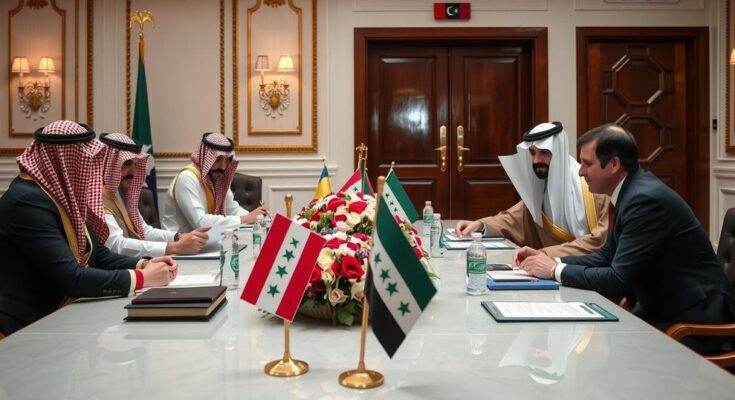Diplomats from the Arab world and Europe convened in Riyadh to discuss support for Syria following the fall of Bashar al-Assad. Saudi Arabia is aiming to lead recovery efforts amid ongoing sanctions, while the European Union considers lifting restrictions under specific conditions. The meeting indicates a shift in regional dynamics, as countries seek stability and cooperation with Syria’s new leadership.
High-ranking diplomats from the Arab world and European nations convened in Riyadh, Saudi Arabia, to engage in critical discussions regarding support for Syria following the recent overthrow of Bashar al-Assad. The meeting is structured into two sessions: the first featuring Arab officials and the second including participation from Turkey, France, the European Union, the United Kingdom, and the United Nations. These conversations aim to pave the way for stability as Syria’s new leadership seeks relief from sanctions imposed due to previous human rights violations.
The dialogue occurs against the backdrop of Syria’s ongoing humanitarian crisis, which has seen over 500,000 lives lost and millions displaced amidst a prolonged civil conflict that began in 2011. The European Union, represented by its chief diplomat Kaja Kallas, indicated a willingness to reconsider existing sanctions contingent upon the new government establishing a more inclusive political framework that safeguards minority rights. Saudi Arabia, which severed ties with Assad in 2012 but later welcomed him back into the Arab League, is actively seeking to lead regional efforts to assist Syria’s recovery.
Recent developments, including Saudi Arabia’s provision of humanitarian aid, signify its commitment to supporting Syria’s transition. However, there remain concerns about the extent of resources and time Saudi Arabia is willing to invest in this initiative amidst ongoing sanctions. The gathering also continues discussions initiated in prior meetings held in Jordan, demonstrating a collaborative effort among nations in the region to facilitate a stable post-war environment in Syria while addressing the threats of terrorism and extremist factions.
Experts note that Saudi Arabia’s cautious approach to engaging with Syria’s new leadership positions it strategically in a landscape where Turkey and Qatar have already established greater influence by reopening their embassies in Damascus. Thus, the meeting provides an opportunity for Riyadh to enhance its diplomatic role and influence within Syria during this transition period.
The talks in Saudi Arabia highlight the geopolitical dynamics surrounding Syria following the removal of Bashar al-Assad and the establishment of a new leadership under Ahmed al-Sharaa. The engagement of Arab and European diplomats underscores an emerging consensus on the necessity for coordinated international support for Syria, as the country grapples with the aftermath of a devastating civil conflict that has spanned over a decade. The discussions are also reflective of shifting alliances and the evolving role of regional powers in the stabilization effort, particularly with Saudi Arabia signaling a transformed stance toward the Syrian government.
In summary, the gathering of diplomats in Riyadh reflects a pivotal moment in international efforts to support Syria’s recovery post-Assad. While there is a growing openness among Western nations to consider lifting sanctions if the new regime demonstrates significant governance reforms, the enduring humanitarian crisis poses substantial challenges. Saudi Arabia’s proactive role could be instrumental in shaping Syria’s future, yet its effectiveness will depend on the cooperation of the new leadership and a united international front.
Original Source: www.voanews.com




